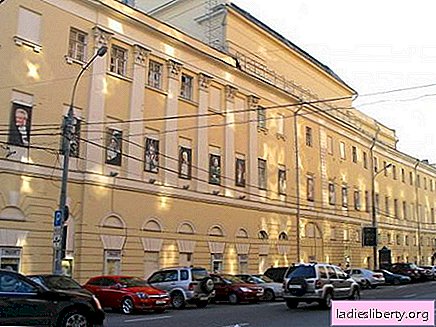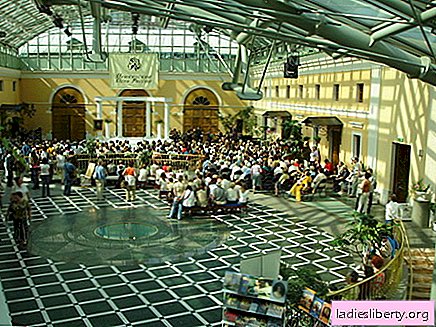
On October 26, Austrians celebrate National Day of the Austrian Republic, which recalls the withdrawal of allied forces from the country in 1955. Prior to this date, the occupying forces of the Allies remained on Austrian territory for 10 years after the Second Sea War. In May 1955, a treaty was signed in Vienna, which completely restored Austria's sovereignty, followed by the withdrawal of Allied forces from the country and the adoption of a federal constitutional law securing Austria's permanent neutrality.
Residents of the United States and some countries of Latin America and Europe October 26 celebrate Mother-in-law Day, which in the twenties of the last century began to celebrate as a joke, however, many people liked this idea, and the holiday took root. On this day, the son-in-law should thank the mother-in-law for the good upbringing of her daughter, who has become a wonderful wife and caring mother, and give her a present.
October 26 in Orthodox Greece, Bulgaria and Romania commemorate St. Dmitry Solunsky. The son of a Roman proconsul in Thessaloniki, he held a military post and was to oppress Christians. However, Dmitry, raised by his parents in the traditions of Christianity, began to preach himself, for which he was killed. Later he was canonized, and his relics were considered a shrine. Orthodox Christians honor Dmitry Solunsky in November.
This holiday is annually held in the city of Goychay, which is a recognized center of garnet production in Azerbaijan. Representatives of the government, the public, residents of the city and its guests take part in it. The main event of the holiday is a pomegranate fair, which takes place in the center of the city, and in the evening guests of the holiday can watch a concert and admire the beautiful fireworks.
On October 26, Orthodox worship the memory of the miraculous Iveron Icon of the Blessed Virgin Mary, also called the Gatekeeper or Gatekeeper. The original icon, which, according to legend, was written by the Evangelist Luke himself, is stored in Greece, in the Iversky monastery on Mount Athos. Such a legend is associated with the acquisition of the icon. In the IX century, a resident of Nicaea with the goal of saving the face of the Virgin from the iconoclasts, the icon was lowered into the sea, where she stayed for about two centuries. In the XI century, the monks living in the Iversky monastery saw an image of the Virgin over the water surface, which was supported by a pillar of fire. At the direction of the Virgin Mary, the Monk Gabriel Svyatorets, walking on the water, took the icon and brought it to the monastery, but in the morning the face was discovered above the gates of the monastery. The icon was again brought to the monastery, but the situation repeated itself. Then the monks realized that she herself had chosen the place in which she should be. Thus, she received the name Gatekeeper (Goalkeeper). This icon has always been one of the most revered in Russia, it was asked for comfort in the grief, for deliverance from troubles, for protection against fire and for a good harvest. On Iverskaya, the Russian people had a tradition of arranging bathing routine - bringing various healing herbs to the bathhouse. It was believed that in a hotly heated bath on this day, a healing herbal spirit could cure patients suffering from epilepsy.
Also, these days in ancient times the people celebrated Makoshi day, in Slavic paganism - the goddess of marriage and childbirth, the patroness of the feminine, the protector of women and girls. The ancient Slavs commemorated Makosh on Friday. According to some sources, her cult arose from 30 to 40 thousand years ago. The symbol of this goddess is yarn or spindle, which they brought to the place of sacrifice. On this day, women did not spin, did not wash, did not bathe themselves and did not bathe their children. After the Makosh day, Slavic women began basic work related to sewing and needlework. Interestingly, Halloween has its roots in this holiday.
On this day, they celebrate Benjamin, Innocent, Karp, Nikita, Trofim.
October 26, 1824 The official opening of the Maly Theater took place in Moscow. It became part of the imperial theater system in 1806, but at first the drama and opera and ballet troupes worked together. From October 26, 1824, the venue for dramatic performances was the building on Petrovskaya (Theater Square) from 1829, at the same time the theater became known as Maly; another theater, opened in 1825, intended to show opera and ballet performances, was called the Bolshoi.
October 26, 1863 representatives of eleven London football clubs created the Association, which became the first football union in the world. Its members developed a set of rules of 13 points, which in many respects are similar to those that operate today, and to some extent served as the basis for them.
October 26, 1920 The Council of People's Commissars issued a decree on the collection and sale abroad of confiscated Russian art values. Over the next decade, a merciless sale of art was carried out, which significantly devastated national repositories.
October 26, 1927 in Paris, the Jewish anarchist Solomon Schwarzbard, who shot Petliura, was acquitted. Schwarzbard lost 15 relatives in the Jewish pogroms carried out by the Petliurites. Killing Simon Petlyura, he did not escape from the scene, and he surrendered to the police. Among those who spoke in court on the side of the accused were Einstein and Gorky, and the well-known French lawyer Henri Torrez was assigned to defend him.
October 26, 1932 there was a meeting of senior leaders of the USSR with writers in the house of Maxim Gorky on Malaya Nikitskaya. It was then that Stalin said that writers are "engineers of human souls." Maxim Gorky, L. Averbakh, M. Koltsov and others spoke at the meeting from writers.
October 26, 1955 the Republic of Vietnam was created, the capital of which was Saigon. Supported by China and the USSR, it supported the guerrilla war in South Vietnam, which was an ally of the United States. In 1961, the United States began to directly take part in military operations in Vietnam. In August 1964, the US Congress in order to save the South Vietnamese regime adopted the "Tonkin Resolution", which gave rise to open US aggression against North Vietnam. It was only in January 1973 that the Quadripartite Agreement was signed, ending the war in Vietnam, and the last American soldier left the country in March. US losses in this war amounted to 56-58 thousand people, not counting those 129 thousand veterans who died later as a result of suicide. Vietnam lost up to three million people in this war.
Giuseppe Domenico Scarlatti (1685-1757), the famous French composer of the era of classicism, who wrote more than five hundred sonatas for keyboards.
Andrey Bely (Boris Nikolaevich Bugaev), (1880-1934), Russian and Soviet writer and poet.
Vladimir Karpovich Zheleznikov (born in 1925), Soviet writer, playwright and screenwriter, author and co-author of the scripts of many famous films. For work on the paintings "Eccentric from the fifth" B "" and "Scarecrow" Zheleznikov received the USSR State Prize. In 1988, he headed the Globus movie studio, making films for children.
Vladimir Terentyevich Kashpur (1926-2009), Soviet and Russian film actor, People's Artist of Russia. In his assets - more than forty films of various genres, among which - "The commander of a happy" pike, "There is no ford in the fire", "Cold summer of the fifty-third", etc.
Igor Fedorovich Maslennikov (born in 1931), Soviet and Russian film director. Among his works - a popular series of films about the adventures of Sherlock Holmes and Dr. Watson, the trilogy "Winter Cherry", as well as about 30 more films, some of which Maslennikov himself wrote the script. Igor Fedorovich also conducts active public and teaching activities, he has numerous awards and prizes of various film festivals.
Dmitry Evgenievich Sychev (born in 1983), a well-known Russian football player, since 2004 he has been a Lokomotiv player and a member of the Russian national team.
Vereshchagin Vasily Vasilievich (1842-1904), Russian artist, writer, publicist. He died in 1904 on the flagship battleship "Petropavlovsk", assaulting Japanese mines.
Dmitry Mikhailovich Karbyshev (1880-1945), a talented Soviet military leader, lieutenant general of engineering troops. In August 1941, he was captured by the wounded and kept in German concentration camps, where he led the camp resistance movement. In February 1945, Karbyshev died in the Mauthausen concentration camp when, along with other prisoners, he was doused with water in the cold. For many years he became a symbol of the courage and stamina of a Soviet officer.
Napoleon Hill (1883-1970), a brilliant American journalist who became famous for a series of interviews with famous people, including Henry Ford, Clarence Darrow, Dale Carnegie and others. In 1928, Hill published a book containing his own recipe for success.
Francois Mitterrand (1916-1996), a French politician, was the leader of the socialist movement of France and the President of the country in 1981-1995.











